
Heart Rhythm Disorders
- Heart Rhythm Disorders
- What is Heart Rhythm Disorders?
- What Are the Types of Heart Rhythm Disorders?
- What is the Importance of Heart Rhythm Disorders?
- Who are in the Risk Group for Heart Rhythm Disorders?
- Are Heart Rhythm Disorders Hereditary?
- What are the Treatment Methods for Heart Rhythm Disorders?
- What Precautions Should Be Taken to Prevent Heart Rhythm Disorders?
What is Heart Rhythm Disorders?
Heart rhythm disorders, also known as arrhythmias, are conditions that affect the regularity or speed of your heartbeat. Your heart has its own electrical system that regulates the timing and coordination of each heartbeat, and when this system doesn't function properly, it can result in an arrhythmia.
There are several types of arrhythmias, including:
- Bradycardia: A slow heart rate (less than 60 beats per minute)
- Tachycardia: A fast heart rate (more than 100 beats per minute)
- Atrial fibrillation: A common arrhythmia where the upper chambers of the heart quiver or fibrillate instead of contracting properly
- Supraventricular tachycardia: A fast heart rate that originates in the upper chambers of the heart
- Ventricular tachycardia: A fast heart rate that originates in the lower chambers of the heart
- Ventricular fibrillation: A life-threatening arrhythmia where the lower chambers of the heart quiver instead of contracting properly.
Heart rhythm disorders can be caused by various factors, including heart disease, genetics, medications, and lifestyle choices. Some arrhythmias may not cause any symptoms, while others can cause dizziness, fatigue, shortness of breath, chest pain, or even loss of consciousness. Treatment options depend on the type and severity of the arrhythmia and may include medication, lifestyle changes, or medical procedures such as ablation or implantable devices.
What Are the Types of Heart Rhythm Disorders?
There are several types of heart rhythm disorders or arrhythmias, which can be classified based on the part of the heart affected and the rate of the abnormal heart rhythm. Some of the most common types of heart rhythm disorders include:
- Atrial fibrillation: This is a very common arrhythmia that affects the upper chambers of the heart (the atria). In atrial fibrillation, the atria beat irregularly and often too fast, which can lead to a rapid and irregular heartbeat.
- Supraventricular tachycardia: This is a group of arrhythmias that originate in the upper chambers of the heart (the atria) or the junction between the atria and the lower chambers of the heart (the ventricles). These arrhythmias can cause a fast and regular heartbeat.
- Ventricular tachycardia: This is an arrhythmia that originates in the lower chambers of the heart (the ventricles) and causes a rapid heartbeat. Ventricular tachycardia can be life-threatening and requires immediate medical attention.
- Ventricular fibrillation: This is a serious and life-threatening arrhythmia in which the ventricles quiver or fibrillate instead of contracting properly, causing the heart to stop pumping blood.
- Bradycardia: This is an arrhythmia in which the heart beats too slowly (less than 60 beats per minute), which can lead to fatigue, dizziness, and fainting.
- Heart block: This is a condition in which the electrical signals that control the heartbeat are delayed or blocked as they travel through the heart's electrical system. Heart block can cause a slow or irregular heartbeat.
- Long QT syndrome: This is a genetic disorder that affects the electrical system of the heart and can cause a rapid and irregular heartbeat.
Treatment for heart rhythm disorders depends on the type and severity of the arrhythmia and may include medication, lifestyle changes, medical procedures such as ablation or implantable devices, or a combination of these.
What is the Importance of Heart Rhythm Disorders?
Heart rhythm disorders or arrhythmias are important because they can have serious health consequences if left untreated. The heart relies on a regular, coordinated rhythm to pump blood effectively and efficiently to the body's organs and tissues. When the heart's rhythm is disrupted, blood flow can be reduced or even stopped, leading to symptoms ranging from mild to life-threatening.
Some arrhythmias, such as atrial fibrillation, can increase the risk of blood clots, stroke, heart failure, and other complications. Ventricular tachycardia and ventricular fibrillation, on the other hand, can cause sudden cardiac arrest, a condition in which the heart stops pumping blood and can lead to death within minutes if not treated immediately.
Heart rhythm disorders can also impact a person's quality of life. Some arrhythmias can cause symptoms such as palpitations, dizziness, fainting, and shortness of breath, which can limit a person's ability to perform everyday activities.
It's important to note that not all arrhythmias are dangerous, and some may not require treatment. However, if you experience symptoms of an arrhythmia, it's important to speak with your healthcare provider, who can perform diagnostic tests and recommend the appropriate treatment based on your specific condition.
Who are in the Risk Group for Heart Rhythm Disorders?
Heart rhythm disorders or arrhythmias can affect people of all ages and backgrounds, but there are certain risk factors that can increase the likelihood of developing an arrhythmia. Some of the most common risk factors for heart rhythm disorders include:
- Age: The risk of developing an arrhythmia increases with age, as the heart's electrical system can become less efficient over time.
- Family history: Some arrhythmias, such as long QT syndrome, are hereditary and can be passed down through families.
- Heart disease: A history of heart disease, including high blood pressure, coronary artery disease, heart valve problems, and heart failure, can increase the risk of developing an arrhythmia.
- Electrolyte imbalances: Abnormal levels of electrolytes, such as potassium, sodium, and magnesium, can disrupt the heart's electrical system and cause arrhythmias.
- Medications and other substances: Certain medications, such as beta-blockers, can cause arrhythmias as a side effect, and other substances, such as alcohol and illegal drugs, can also disrupt the heart's rhythm.
- Stress and anxiety: Emotional stress and anxiety can trigger arrhythmias in some people.
- Sleep apnea: This condition, in which breathing repeatedly stops and starts during sleep, has been linked to an increased risk of atrial fibrillation.
- Genetic conditions: Some genetic conditions, such as Brugada syndrome and hypertrophic cardiomyopathy, can increase the risk of developing arrhythmias.
It's important to note that having one or more of these risk factors doesn't necessarily mean that a person will develop an arrhythmia, and many people with arrhythmias have no identifiable risk factors. However, if you have any of these risk factors, it's important to speak with your healthcare provider about ways to reduce your risk and monitor your heart health.
Are Heart Rhythm Disorders Hereditary?
ome heart rhythm disorders can be genetic or hereditary. For example, long QT syndrome, Brugada syndrome, catecholaminergic polymorphic ventricular tachycardia, and some other heart rhythm disorders are conditions that can be passed down genetically. In these cases, a person can inherit affected genes from one or both parents.
However, most heart rhythm disorders can also be caused by non-hereditary factors. Age, heart disease, high blood pressure, electrolyte imbalances, drugs, and certain medications are some of the factors that can increase the risk of heart rhythm disorders.
While a genetic etiology may exist for some heart rhythm disorders, genetic factors do not always determine the risk of developing a heart rhythm disorder. If you suspect you have a heart rhythm disorder, it's important to consult a healthcare professional who can evaluate all potential risk factors, including both hereditary and non-hereditary factors.
What are the Treatment Methods for Heart Rhythm Disorders?
The treatment for heart rhythm disorders (arrhythmias) depends on the type and severity of the condition. Here are some common treatment methods:
- Medications: Antiarrhythmic medications are often the first line of treatment for arrhythmias. They work to regulate the heart's rhythm and prevent future episodes of arrhythmia.
- Cardioversion: This is a procedure in which an electrical shock is used to reset the heart's rhythm to normal. It can be done either with medications or with a defibrillator.
- Ablation therapy: This is a procedure in which a catheter is inserted through a vein and guided to the heart, where it delivers radiofrequency energy to destroy the small area of heart tissue that is causing the arrhythmia.
- Pacemaker: This is a small device that is implanted under the skin of the chest or abdomen, and it sends electrical impulses to the heart to regulate its rhythm.
- Implantable cardioverter-defibrillator (ICD): This is a small device that is implanted under the skin of the chest and it monitors the heart's rhythm. If it detects an abnormal rhythm, it can deliver an electrical shock to reset the heart's rhythm.
- Surgery: In some cases, surgery may be necessary to correct the underlying structural problems that are causing the arrhythmia.
The treatment plan for an arrhythmia may also include lifestyle changes, such as reducing stress, avoiding certain substances that can trigger arrhythmias, managing other health conditions, and getting regular exercise. It's important to work closely with a healthcare professional to determine the best treatment approach for your specific situation.
What Precautions Should Be Taken to Prevent Heart Rhythm Disorders?
Here are some precautions that can be taken to help prevent heart rhythm disorders:
- Adopt a healthy lifestyle: Follow a healthy eating plan, engage in regular physical activity, avoid smoking, limit alcohol consumption, and manage stress.
- Manage other health conditions: Keeping other health conditions like high blood pressure, diabetes, and obesity under control can help reduce your risk of heart rhythm disorders.
- Take medications as prescribed: Some medications can increase the risk of heart rhythm disorders, so it's important to take prescription drugs as prescribed by your doctor.
- Limit caffeine and alcohol intake: Caffeine and alcohol can increase the risk of heart rhythm disorders, so it's important to limit their consumption.
- Manage stress: Stress can increase the risk of heart rhythm disorders. You can manage stress by trying yoga, meditation, deep breathing, and other techniques.
- Get regular checkups: Regular doctor checkups can help reduce your risk of heart rhythm disorders.
In summary, adopting a healthy lifestyle, managing other health conditions, taking medications as prescribed, limiting caffeine and alcohol intake, managing stress, and getting regular checkups are important precautions that can be taken to help prevent heart rhythm disorders.



